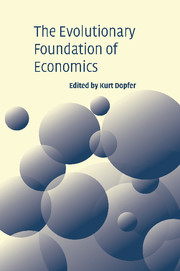Book contents
- Frontmatter
- Contents
- List of contributors
- List of figures
- List of tables
- Prolegomenon
- I Ontological foundations
- 2 The rediscovery of value and the opening of economics
- 3 Synergetics: from physics to economics
- 4 Darwinism, altruism and economics
- 5 Decomposition and growth: biological metaphors in economics from the 1880s to the 1980s
- 6 Path dependence in economic processes: implications for policy analysis in dynamical system contexts
- 7 Is there a theory of economic history?
- II A framework for evolutionary analysis
- Index of topics
- Index of names
- References
2 - The rediscovery of value and the opening of economics
Published online by Cambridge University Press: 22 September 2009
- Frontmatter
- Contents
- List of contributors
- List of figures
- List of tables
- Prolegomenon
- I Ontological foundations
- 2 The rediscovery of value and the opening of economics
- 3 Synergetics: from physics to economics
- 4 Darwinism, altruism and economics
- 5 Decomposition and growth: biological metaphors in economics from the 1880s to the 1980s
- 6 Path dependence in economic processes: implications for policy analysis in dynamical system contexts
- 7 Is there a theory of economic history?
- II A framework for evolutionary analysis
- Index of topics
- Index of names
- References
Summary
The open universe
It is only in the nineteenth century that we find a discipline called ‘economic science’. At this time, the Western world was dominated by Cartesian dualism. On one side there was matter, ‘res extensa’, described by deterministic laws, while on the other there was ‘res cogitans’, associated with the human mind. It was accepted that there was a fundamental distinction between the physical world and the spiritual – the world of human values. When Thomas Hooke drew up the statutes of the Royal Society in 1663, he inscribed as the objective ‘to improve the knowledge of natural things, and all useful Arts, Manufactures’, adding the phrase ‘not meddling with Divinity, Metaphysics, Moralls, Politicks, Grammar, Rhetoricks, or Logick’. These statutes incarnated already the division of the ways of knowing into what C. P. Snow would later call the ‘two cultures’. This separation of the two cultures rapidly assumed the flavour of a hierarchy, at least in the eyes of scientists. On one side, we had the laws of nature, of which Newton's second law (acceleration proportional to force) was the foremost example. These laws (including today quantum mechanics and relativity) have two general aspects. They are deterministic (if you know the initial conditions, both future and past are determined) and time-reversible. Past and future play the same role. Therefore, science was associated with certainty.
- Type
- Chapter
- Information
- The Evolutionary Foundations of Economics , pp. 59 - 69Publisher: Cambridge University PressPrint publication year: 2005
References
- 9
- Cited by



